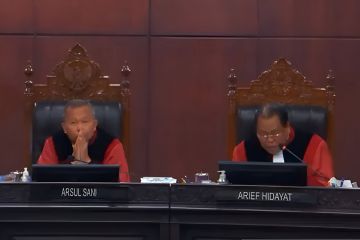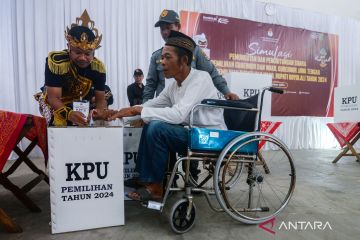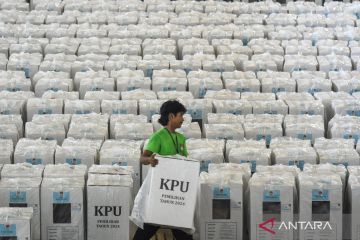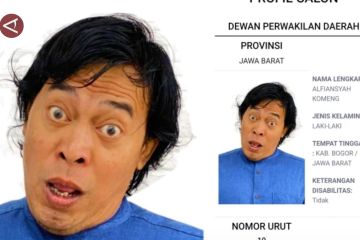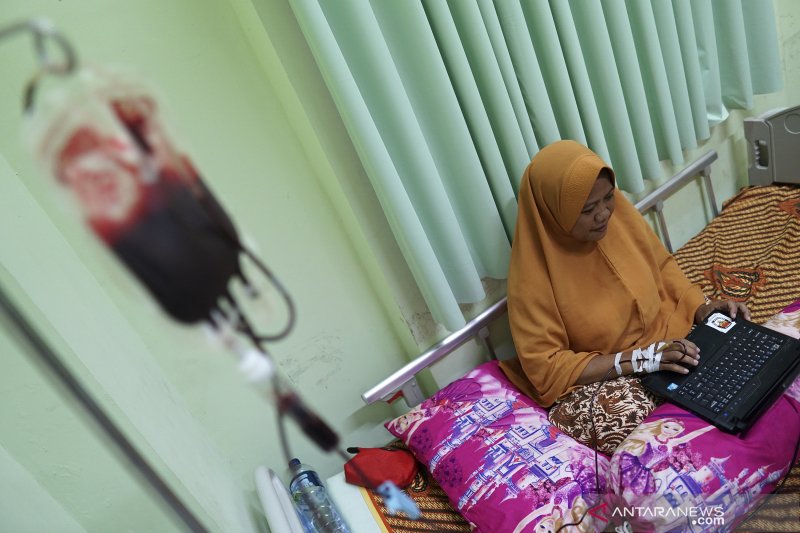
Indonesia’s simultaneous legislative and presidential elections were not only the largest single-day democratic exercise but also resulted in unexpected martyrs -- 253 polling officers, 55 election supervisors, and 18 police officers -- dying of exhaustion.
The elections, held on Apr 17, added complexity and increased the burden on over 192 eligible voters, who had to decide on their president, vice president, members of the House of Representatives (DPR), senators of the Regional Representative Council (DPD), members of Provincial Legislative Council (DPR I), and members of the District/Municipality Legislative Council (DPRD II).
Indonesia's foremost simultaneous legislative and presidential elections were chiefly held to save time, reduce energy, and curtail costs, but in reality, the contrary took place, with the execution being frenzied, costly, and siphoning off the lives of 326 executors.
Different parties have vehemently called for conducting a complete and comprehensive assessment of the elections organized in over 810 thousand polling stations across Indonesia and overseas.
"We should hold a total evaluation. We will ready a format to prioritize electoral efficiency, albeit involving multi-stage execution," Chairman of Gerindra Party's Executive Board Ahmad Riza Patria noted in a recent statement.
Patria confirmed that his side had called to conduct an absolute assessment of the elections, with a reported voter turnout of some 80 percent.
"We will conduct an assessment in the Commission II of the House of Representatives (DPR), along with the Government, General Election Commission (KPU), and Election Supervisory Agency (Bawaslu), and call for legislative and presidential elections to be held separately next time," he remarked.
Adopting a similar stance, DPR Speaker Bambang Soesatyo had put forth a formal request to the Indonesian government and KPU to hold a joint assessment of the execution of the 2019 Election.
"This specifically pertains to the call for immediately applying an electoral system that is not financially burdensome, effective, and far from complicated in addition to ensuring that large number of martyrs, in terms of the election organizers, supervisors, and security forces, do not have to pay the ultimate price for the world's most complicated democratic party," he remarked, calling on the need to no longer follow the concept of the 2019 elections in future.
Soesatyo opined that the electoral process can be streamlined by putting in place an e-voting system, thus making it redundant for several organizing committees, supervisors, witnesses, and extensive security to procure voting booths, ballot boxes, ballots, and ink.
To this end, the speaker believes that the electoral process can be simplified and expedited, in terms of calculation and recapitulation of votes, by the application of an e-voting system and also not mean literal death for several of the executors.
"Hence, following the declaration of election results on May 22, I appeal to the KPU to prepare facilities and infrastructure along with conducting a comprehensive study of the planned execution of elections and polling with the application of an e-voting system," he remarked.
Soesatyo further appealed to factions in the Indonesian Parliament, as an extension of political parties, to ascertain that the presidential and legislative elections are executed akin to earlier elections.
In the meantime, a political observer noted that officers, tasked with implementing the elections, were ill-prepared to fulfill mammoth tasks entailed in these elections.
"The fatal end of so many election executors exposes the grim reality that they were unprepared to execute such a colossal event on a single day," Anggalana, University of Bandarlampung's political scientist, stated.
Anggalana viewed that theoretically, the Commission should have been able to execute the elections without any glitches, but those on field were overwhelmed by the tasks at hand.
The observer pointed out that the stress, fatigue, and lack of sleep while fulfilling their electoral duties in the face of time restraints arising from adopting the single-day election approach ultimately took toll of their lives, so henceforth, the ballot counting and polling should be held on separate days.
"With over a day in hand, officers will be able to take a break. In the recently concluded elections, the organizers literally broke their backs, slogging long hours, from dawn until 10 p.m. local time and also extending until the next morning to continue the ballot counting process," he pointed out.
In addition, the KPU should increase the number of polling stations, so that on-field officers are not overburdened on the polling day, he stated.
"It is common knowledge that fatigue primarily resulted in the deaths of officers," he remarked.
Anggalana drew attention to the fact that a polling station handled 200-300 eligible voters during the day of the 2019 concurrent election, when it should have ideally been serving no more than 100-120 voters to ensure efficient workflow.
He also suggested organizing the next elections digitally if Indonesia would hold another simultaneous election subsequently, with close to seven different ballot cards.
Related news: MUI calls for election evaluation over many poll officers' death
Related news: DPR seeks prompt evaluation of 2019 election by Government, KPU
Related news: Jokowi condoles deaths of over 90 election officers
The elections, held on Apr 17, added complexity and increased the burden on over 192 eligible voters, who had to decide on their president, vice president, members of the House of Representatives (DPR), senators of the Regional Representative Council (DPD), members of Provincial Legislative Council (DPR I), and members of the District/Municipality Legislative Council (DPRD II).
Indonesia's foremost simultaneous legislative and presidential elections were chiefly held to save time, reduce energy, and curtail costs, but in reality, the contrary took place, with the execution being frenzied, costly, and siphoning off the lives of 326 executors.
Different parties have vehemently called for conducting a complete and comprehensive assessment of the elections organized in over 810 thousand polling stations across Indonesia and overseas.
"We should hold a total evaluation. We will ready a format to prioritize electoral efficiency, albeit involving multi-stage execution," Chairman of Gerindra Party's Executive Board Ahmad Riza Patria noted in a recent statement.
Patria confirmed that his side had called to conduct an absolute assessment of the elections, with a reported voter turnout of some 80 percent.
"We will conduct an assessment in the Commission II of the House of Representatives (DPR), along with the Government, General Election Commission (KPU), and Election Supervisory Agency (Bawaslu), and call for legislative and presidential elections to be held separately next time," he remarked.
Adopting a similar stance, DPR Speaker Bambang Soesatyo had put forth a formal request to the Indonesian government and KPU to hold a joint assessment of the execution of the 2019 Election.
"This specifically pertains to the call for immediately applying an electoral system that is not financially burdensome, effective, and far from complicated in addition to ensuring that large number of martyrs, in terms of the election organizers, supervisors, and security forces, do not have to pay the ultimate price for the world's most complicated democratic party," he remarked, calling on the need to no longer follow the concept of the 2019 elections in future.
Soesatyo opined that the electoral process can be streamlined by putting in place an e-voting system, thus making it redundant for several organizing committees, supervisors, witnesses, and extensive security to procure voting booths, ballot boxes, ballots, and ink.
To this end, the speaker believes that the electoral process can be simplified and expedited, in terms of calculation and recapitulation of votes, by the application of an e-voting system and also not mean literal death for several of the executors.
"Hence, following the declaration of election results on May 22, I appeal to the KPU to prepare facilities and infrastructure along with conducting a comprehensive study of the planned execution of elections and polling with the application of an e-voting system," he remarked.
Soesatyo further appealed to factions in the Indonesian Parliament, as an extension of political parties, to ascertain that the presidential and legislative elections are executed akin to earlier elections.
In the meantime, a political observer noted that officers, tasked with implementing the elections, were ill-prepared to fulfill mammoth tasks entailed in these elections.
"The fatal end of so many election executors exposes the grim reality that they were unprepared to execute such a colossal event on a single day," Anggalana, University of Bandarlampung's political scientist, stated.
Anggalana viewed that theoretically, the Commission should have been able to execute the elections without any glitches, but those on field were overwhelmed by the tasks at hand.
The observer pointed out that the stress, fatigue, and lack of sleep while fulfilling their electoral duties in the face of time restraints arising from adopting the single-day election approach ultimately took toll of their lives, so henceforth, the ballot counting and polling should be held on separate days.
"With over a day in hand, officers will be able to take a break. In the recently concluded elections, the organizers literally broke their backs, slogging long hours, from dawn until 10 p.m. local time and also extending until the next morning to continue the ballot counting process," he pointed out.
In addition, the KPU should increase the number of polling stations, so that on-field officers are not overburdened on the polling day, he stated.
"It is common knowledge that fatigue primarily resulted in the deaths of officers," he remarked.
Anggalana drew attention to the fact that a polling station handled 200-300 eligible voters during the day of the 2019 concurrent election, when it should have ideally been serving no more than 100-120 voters to ensure efficient workflow.
He also suggested organizing the next elections digitally if Indonesia would hold another simultaneous election subsequently, with close to seven different ballot cards.
Related news: MUI calls for election evaluation over many poll officers' death
Related news: DPR seeks prompt evaluation of 2019 election by Government, KPU
Related news: Jokowi condoles deaths of over 90 election officers
Reporter: Fardah
Editor: Azizah Fitriyanti
Copyright © ANTARA 2019
Editor: Azizah Fitriyanti
Copyright © ANTARA 2019






